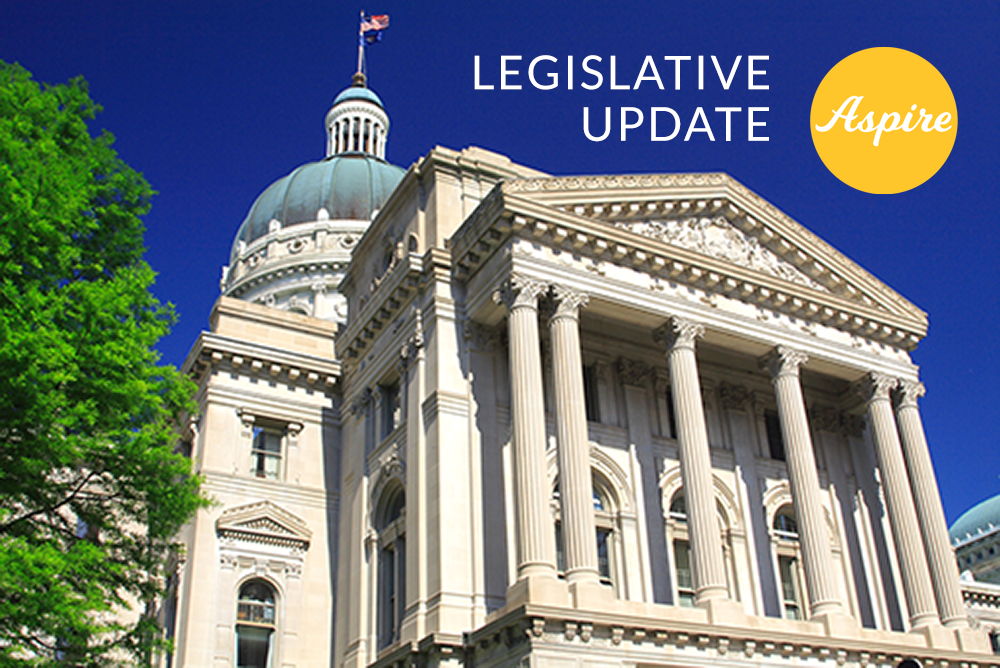Statehouse Update: GOP Priorities Move, Small Business Tax Deduction Fast Tracking

We concluded a busy week four at the Statehouse last week where both chambers began to coalesce around caucus priority matters, which coincide with two Aspire priorities. We saw committee consensus on several proposals, including data protection. This week’s update will begin with Aspire priorities then update you on some other major developments moving forward.
Be sure to read to the end for a small business tax deduction bill fast-tracking its way through session. It will most likely impact you – and your CPA – this April.
Work Share
We know that employees are the currency of business today, and SB 347 is a step in the right direction to improving employee retention when faced with an economic downturn. Aspire has supported the launch of this program for several years. We testified in support of this bill in the Senate Labor and Pensions Committee last week. It has bipartisan support and will be held for a committee vote this Wednesday. We will be there.
As we previously explained, this is an alternative to the traditional unemployment system. Employers could instead apply for a Work Share program with the Department of Workforce Development (DWD) to reduce the affected employees’ hours and request the state provide reduced unemployment benefits. This is not a new entitlement program, and only available as an option at the employer level. It keeps the affected employee connected to their employer-sponsored benefits and W-2 wages. And SB 347 currently states the affected employees may participate in employer-sponsored training and education during the affected hours. This is good because the employee could theoretically retrain for other positions within the company, which aids in the long-term retention of that employee.
Child Care / Early Childhood Education
Five Senate bills were filed on this Aspire 2023 priority. SB 368 establishes a pilot program in NE Indiana to provide a cost sharing approach to fund quality early childhood education. The bill was heard in the Senate Family and Children Services committee but has not been rescheduled. We have had discussions with other chambers around Indiana about how this could be expanded statewide should the bill move.
Three separate bills – SB 186, SB 238, and SB 255 – all deal with child care tax credits. This would be a powerful tool to help encourage employers wanting to invest in childcare benefits to support hiring and retention. And it would be a boost to improving Indiana’s dwindling labor participation rate. None of these bills have been scheduled for a hearing at this time. We will continue to advocate.
The only bill moving is SB 375, a child care assistance bill authored by Republican Senator Linda Rogers. The bill requires the family and social services administration (FSSA) to develop a schedule for state reimbursement to child care providers so that the highest reimbursement rate does not differ from the lowest by more than 50%. Additionally, it would more than double the income eligibility limit for family grants under the On My Way Pre-K program to 260% of the federal poverty level (but tiered for those over 200%).
This bill is helpful because it would expand family access to the On My Way Pre-K program, which will help employers by improving Indiana’s labor participation rate. It will also help ensure rural community providers – mostly operating in “childcare deserts” – receive a fair share of state funds so they may attract and keep quality teachers and build quality programs. This bill was heard in the Senate Family and Children Services committee this week. Aspire was there to testify in support of the bill.
Workforce Housing
A community’s number one asset is its people. (Picking up on a theme here? People, people, people!) The State can be a partner in attracting and retaining people through policies and programs to make housing more affordable and available. (Local cites and towns can be partners, too.)
We were happy HB 1005 passed out of committee and heard on the House chamber floor this week. Among other recommendations from last summer’s Housing Taskforce final report, this bill includes revolving loans to local cities and towns for housing infrastructure. While Johnson County’s fast-growing municipalities might not need access to this fund to spur housing, some rural communities could use it to help entice housing development. And any municipality wishing to redevelop a blighted area with new housing may use this fund to do the expensive lift of readying the land for a housing developer who would not otherwise do so on their own. A specific budget amount has not yet been identified to seed the fund, but the bill’s author acknowledged in the hearing $150-$200 million was originally earmarked for housing in the first round of the IEDC’s Regional Economic Acceleration Development Initiative.
We have also been tracking SB 339 which establishes a tax credit for contributions to an affordable housing organization. As the language currently reads, the credit is not refundable but may be carried forward. It also defines eligible organizations and tasks the Indiana Economic Development Corporation to approve organizations for which a taxpayer is eligible to claim a credit for a contribution. This is a good bill because it could spur private funding for workforce housing. The bill is scheduled this week for a hearing in the Senate Tax and Fiscal Policy committee.
House Committees Hear Proposals to Address Healthcare Costs
Fines for hospitals and tax credits for doctors who are unaffiliated with large healthcare systems are part of a cumulative healthcare bill heard in House Public Health Committee this Wednesday. HB 1004 is priority language for Republicans who claim they are responding to a lack of action on the part of healthcare entities and insurers to lower prices. No votes were taken on this bill, and amendments are expected to be heard in committee this week.
Meanwhile, HB 1003, which takes up the insurance component of this session’s collection of healthcare cost regulations, was heard in the House Committee on Insurance. Language to address the poor return to doctors treating Medicaid patients and delays in the prior authorization process is included in the bill, which authors say aims to increase competition in both the provider and insurance marketplaces. Additional committee discussion is expected to tie over to this week as well.
Privacy Legislation Advances Out of Committee
A bill to create a “bill of rights” for Hoosier data privacy would allow consumers to monitor how their data is used and provide an option to delete it. SB 5 also includes a requirement for businesses to have annual data protection assessments and security checks. (We checked – the business thresholds are pretty high, so this won’t be onerous government regulation for nearly all our members.)
This GOP priority legislation passed unanimously out of the Senate Committee on Senate Commerce and Technology Committee last week and is now up for further consideration by the full Senate.
Don’t File your 2022 Tax Return so Fast – A new Tax Break is Coming!
Thanks for following this long update this week. (You didn’t just skip down here, did you?) This is an update you really need to know.
What’s happening: SB 2 is a Senate Republican priority bill that authorizes partnerships, sole proprietorships, LLCs, and S-Corporations to make an election to pay income tax at the entity-level based on each owner's aggregate share of adjusted gross income, instead of passing the tax liability down to the shareholders individual tax return.
This bill sailed unanimously out of the Senate Committee on Tax and Fiscal Policy last week with a unanimous vote and then heard on the Senate floor. It is expected to pass the full Senate this week and then fast-track through the house. We heard the Governor wants in on his desk yet this month.
How this helps you: This will help company owners get around the federal $10,000 state and local tax deduction limit to individuals by keeping the deduction at the entity level, which has no federal deduction limit. (No, Indiana is not changing the federal tax code, just how/where Indiana entities may deduct state and local taxes.)
A vast majority of Indiana businesses are small businesses organized as pass through entities.
Our support: Duh.
Yes, but: The bill is retroactive to January 1, 2022, and the 2022 tax filing season has already begun. Your friendly CPA may not have the software updates for this Indiana tax code change by April 15. Many of you reading this may need to extend or amend your 2022 return. Unless your CPA runs on Dunkin.
Be patient: Some advocates estimate this bill’s passage could result in an estimated $50 million annual tax savings for business owners. So be nice to your CPA this spring as they scramble late in tax season to apply these savings to your return!
